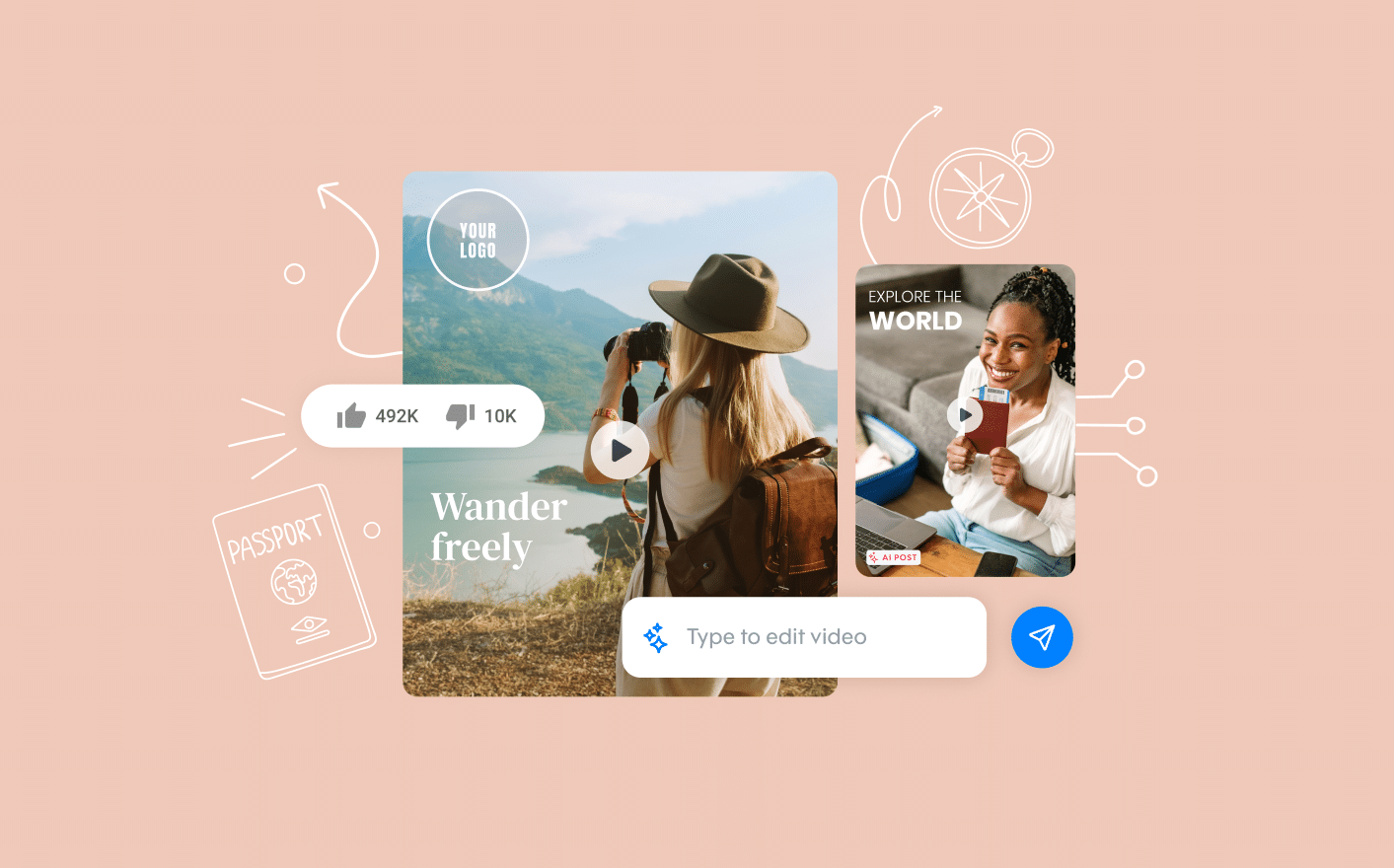
Don’t Get Left Behind: How AI Can Help Your Travel Agency Thrive in 2024

- Blog
- Small Business Tips
- Don’t Get Left Behind: How AI Can Help Your Travel Agency Thrive in 2024
Artificial intelligence (AI) has become a game-changer in the tourism industry, allowing travel agencies and tour operators to deliver personalized experiences, improve operational efficiencies, and stay ahead of the competition. With nearly every company in the tourism sector now utilizing at least one AI-powered technology, the global AI market for travel is projected to reach a massive value of $1.2 billion by 2026. However, despite this widespread adoption, only 13% of travel companies have achieved a level of AI maturity that allows them to fully leverage its potential. This blog explores how travel agencies and tour operators can harness AI to boost their business while providing unforgettable experiences for their clients.
The Rise of AI in the Tourism Industry
AI has become an integral part of the tourism industry, fundamentally reshaping how travel agencies and tour operators conduct business. Over the years, the adoption of AI has transformed both customer experiences and operational efficiencies, helping businesses remain competitive in an increasingly digital world.
Initially, AI’s influence in tourism could be seen in the introduction of online booking systems and basic CRM tools in the late 1990s and early 2000s. These technologies laid the groundwork for the eventual shift from traditional travel agencies to online platforms, offering customers a more convenient way to plan and book their trips.
More recently, AI innovations such as unmanned check-in services, AI-driven chatbots, and personalized travel recommendations have revolutionized the industry. These advancements not only streamline internal operations but also deliver customized, user-friendly experiences for travelers. For example, AI can now analyze vast amounts of data to recommend specific destinations or activities based on an individual’s preferences, ensuring that travelers enjoy more personalized experiences than ever before.
As AI continues to advance, its role in tourism is becoming even more pronounced. From predictive analytics that help businesses optimize pricing and resource allocation to language translation tools that enhance accessibility for international travelers, AI is pushing the boundaries of what’s possible in the tourism sector. Despite some challenges—like data privacy concerns and the costs associated with implementing new technologies—the future of AI in tourism promises further innovation and improvements to both customer satisfaction and business efficiency.
Applications of AI for Tourism Professionals
AI offers a wide range of tools and technologies that can significantly enhance the services travel agencies and tour operators provide, helping them improve customer experiences, streamline operations, and stay competitive in the evolving tourism industry. Let’s explore the key ways AI is being applied to transform tourism businesses today.
Social Media Marketing
In the digital age, a strong social media presence is essential for travel agencies looking to engage clients and attract new customers. Effective social media marketing can help your business stand out in a crowded market by showcasing unique travel experiences and building relationships with potential travelers.
Conveniently, AI has revolutionized social media marketing by enabling travel agencies to create engaging, personalized content effortlessly. Tools like PromoAI streamline the process of generating travel-related videos, posts, and ads for platforms such as Instagram, Facebook, and YouTube. By automating content creation, travel businesses can maintain a consistent online presence and target specific customer segments with tailored marketing campaigns. This increases customer engagement and helps build a stronger online brand identity, making it easier for potential travelers to connect with and trust the agency.
Recommended Tools: PromoAI helps travel agencies create, schedule, and publish AI-driven content, increasing efficiency and enhancing their social media presence.
Customizing Travel Itineraries
Personalized travel itineraries are key to meeting clients’ unique preferences and ensuring they have memorable, tailored experiences. AI can analyze customer data, such as past travel history, preferences, and browsing behaviors, to craft personalized itineraries tailored to individual clients. This technology allows travel agencies to offer a highly customized travel experience, matching travelers with destinations, activities, and accommodations that align with their unique interests. By delivering more relevant recommendations, agencies can increase customer satisfaction and loyalty, while also setting themselves apart from competitors offering more generic options.
Recommended Tools: Tools like Wonderplan and Mindtrip help agencies personalize travel itineraries based on customer data and preferences.
Dynamic Pricing and Promotions
Pricing is a critical factor in travel decision-making for customers at all budgets. AI enables travel agencies to implement dynamic pricing strategies, adjusting prices in real time based on demand, seasonality, and customer preferences. This ensures that agencies remain competitive while optimizing revenue. Additionally, AI can suggest personalized promotions, such as last-minute deals or special offers, that align with the traveler’s budget and interests, increasing the likelihood of conversions.
Recommended Tools: Solutions like QL2’s Opti Price provide AI-powered dynamic pricing to maximize revenue and customer satisfaction.
24/7 Customer Support
Travelers expect quick and efficient assistance, no matter the time of day. AI-powered chatbots and virtual assistants are transforming customer service in the tourism industry by offering instant, around-the-clock support for travelers. With approximately 57% of tourists open to using AI-driven assistants, agencies can streamline customer interactions by automating routine inquiries like flight status updates, booking changes, and itinerary adjustments. This reduces the workload for human agents, allowing them to focus on more complex customer needs, while ensuring travelers receive timely assistance.
Recommended Tools: Zendesk and Tawk.to offer robust AI-driven chatbot solutions that provide 24/7 customer support and handle routine queries.
Multilingual Assistance
Serving a global clientele requires clear communication in multiple languages. AI tools can provide multilingual support, allowing travel agencies to serve a global clientele more effectively. By translating communications in real-time and offering customer service in various languages, AI ensures seamless communication with travelers, regardless of their native language. This is especially beneficial for international travelers who may need assistance in destinations where they don’t speak the local language.
Recommended Tools: Avaamo and Kore.ai offer real-time language translation services that improve communication between agencies and global clients.
Automating Administrative Tasks
Managing bookings, itineraries, and invoices can be time-consuming. AI can automate a wide range of routine administrative tasks, including processing bookings, generating invoices, and managing client itineraries to save your valuable time. By reducing the reliance on manual processes, agencies can minimize human error, save time, and improve overall efficiency. This allows travel professionals to focus more on personalized customer service and business growth, rather than being bogged down by repetitive tasks.
Recommended Tools: Tools like TravelPerk automate booking, invoicing, and itinerary management to streamline administrative workflows.
Optimizing Flight and Hotel Bookings
Efficiently managing flight and hotel bookings is crucial to providing a seamless travel experience. AI can dynamically optimize flight and hotel bookings by analyzing real-time data such as pricing, availability, and travel conditions. This allows travel agencies to adjust reservations on the fly, maximizing convenience and savings for clients. AI tools ensure that travelers receive the best deals while also enhancing the overall travel experience through more efficient bookings.
Recommended Tools: Amadeus and Sabre are popular AI-powered booking platforms that optimize travel reservations and adjustments.
Tailoring Tours to Market Trends
Staying aligned with current market trends ensures your agency remains relevant to modern travelers. By analyzing current market trends, AI helps agencies adapt their tour offerings to meet the growing demands of travelers. This includes customizing travel packages that align with popular trends such as eco-tourism, adventure travel, or wellness retreats. Tailoring tours to reflect what’s popular ensures that agencies remain relevant and can attract more bookings.
Recommended Tools: Tools like PredictHQ provide insights into market trends, helping travel agencies tailor their offerings accordingly.
Real-Time Travel Alerts
Keeping clients informed of potential travel disruptions or safety risks is essential for building trust and ensuring their well-being. AI can monitor global news, weather patterns, and political changes to provide real-time travel alerts for potential disruptions. These systems keep travelers informed about safety risks, flight delays, or emergencies, enabling agencies to proactively manage clients’ itineraries and offer timely adjustments. This not only enhances the travel experience but also builds trust with clients, as they feel supported in times of need.
Recommended Tools: AI-powered platforms like Crisis24 provide real-time travel alerts and updates, ensuring travelers stay informed.
AI-Powered Virtual Guides
The modern traveler values convenience and personalized assistance during their trips. AI-powered virtual assistants can offer travelers real-time, on-demand guidance during their trips. These virtual guides provide local insights, recommend nearby attractions, and offer dining suggestions, all while being easily accessible through smartphones or wearable devices. This enhances the traveler’s experience by delivering personalized assistance tailored to their needs.
Recommended Tools: Platforms like GPTour and Hopguides are fantastic virtual travel guides, offering real-time support and recommendations.
Best Practices for Implementing AI in Travel Agencies
As travel agencies and tour operators increasingly adopt AI to enhance their services, it’s essential to implement these technologies thoughtfully. By following best practices, you can ensure that AI integration not only improves efficiency but also enhances the overall customer experience while maintaining trust and data security.
- Start with Customer-Centric Objectives: Before implementing AI, identify clear goals that focus on improving customer experiences, such as enhancing personalization or optimizing travel itineraries. This ensures AI tools are used to meet client needs effectively.
- Balance Automation with Human Touch: While AI can automate many processes, personal connections still matter in the travel industry. Combine AI with human support to offer a personalized, empathetic service that fosters trust with clients.
- Invest in Data Quality: AI relies on accurate, clean data to function optimally. Ensure your customer data is up-to-date and well-organized to maximize the effectiveness of AI-driven insights and recommendations.
- Ensure Seamless AI Integration: Choose AI tools that integrate smoothly with your existing systems, such as booking platforms or CRM software. This minimizes disruptions and helps create a unified, efficient workflow.
- Be Transparent with Clients About AI Use: Let clients know when AI is being used in customer interactions, such as through chatbots or automated responses. Transparency builds trust and reassures clients that AI is being used to improve their experience.
- Stay Compliant with Data Privacy Regulations: As AI processes sensitive customer data, ensure your practices comply with regulations like GDPR. Implement strong data protection measures to safeguard client information and maintain trust.
Unlocking the Full Potential of AI in Tourism
AI is revolutionizing the travel industry, offering tools that enhance every aspect of the business—from marketing and personalized travel itineraries to dynamic pricing and 24/7 customer support. Travel agencies and tour operators that embrace AI can optimize their operations, deliver exceptional customer experiences, and gain a competitive edge in the market. However, it’s important to implement AI thoughtfully, balancing automation with the human touch that remains central to travel planning. By doing so, you can unlock the full potential of AI and keep your business at the forefront of innovation in the tourism industry.
Ready to elevate your travel marketing strategy? Try PromoAI today and create professional, AI-driven content that resonates with your audience.
Meet PromoAI
Generate a month worth of video content for your business in just one click!
About the author
Daisy Rogozinsky
Daisy Rogozinsky loves to use the written word to educate, entertain, and tell stories. If she's not writing content, she's writing poetry, music, and screenplays.


